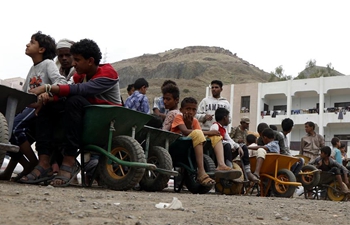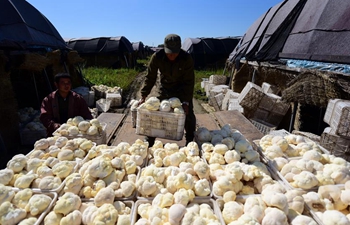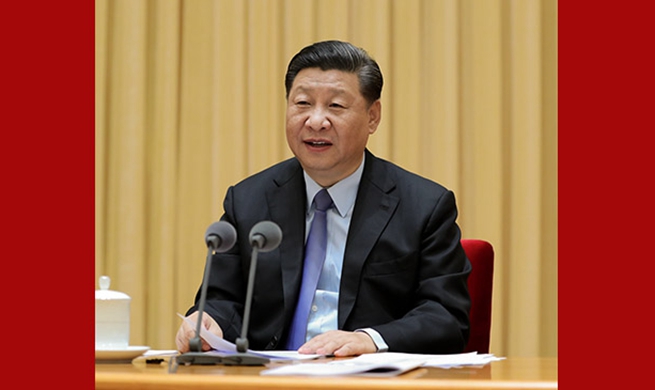by Xinhua Writers Tian Zijun, Niu Shaojie & Ma Xiaoran
ZHENGZHOU, Sept. 11 (Xinhua) -- Wang Dianyong, a 50-year old villager from Yanjin County of Henan Province, was the first among his peers who converted his credit information into loans for his pig farming business.
In 2016, with a loan of 20,000 yuan, Wang took two years to expand his pig farm from a dozen pigs or so to more than 400.
"The bank loan was the solution to all my predicaments," said Wang, "the fact that I was able to pay back every loan in time with interest made me more creditworthy in the eyes of the bank. As of now, my line of credit has reached 300,000 yuan."
The red-colored certificate glued on Wang's front door indicates that he is a five-star client, the most reputable group of individuals among Yanjin bank's clientele.
He has naturally become one of the most reputable clients whose opinions about other applicants' reliability will be highly valued by the banks during the credit assessment.
"It's a very close-knit community where villagers know each other inside and out, so it's almost impossible for anyone to fool me," said Wang.
For farmers like Wang in the county, to apply for an assessment of their credit is the first and most crucial step before they get a loan from the local rural commercial bank.
"The bank will give the applicants different lines of credit based on their credit rating. The higher the rating, the larger the credit line and the lower the interest rate," says Li Xinyue, chairman of the Bank of Agriculture and Commerce in Yanjin County.
The assessment consists of a questionnaire about the applicant's personal information and property conditions, followed by a third-party evaluation of the applicant's reliability.
The questionnaire includes information like education, marital status, health condition, and deposit and loan history. It also contains questions regarding the condition of the applicant's poultry and livestock farm, as well as the amount of farm machinery and contracted farmland they possess.
The third-party evaluation is carried out among the local villagers committee and the bank's reputable clients who are acquainted with the applicant. Based on the information, the bank evaluates if the applicant would be willing to put his money where his mouth is, and how his reputation in the community is.
The questionnaire and the evaluation account for 70 percent and 30 percent of the final assessment respectively.
"An overwhelming number of farmers in China tend to turn to their friends and relatives if they want to raise money," Li said. Since most of them have no experience in dealing with financial institutions, relevant information on their credibility is very limited in the bank's credit reference system, Li added.
"Furthermore, most farmers have no cashable assets to mortgage, it is all down to the banks to figure out a way to rate their clients," said Li.
Chinese traditional culture values honesty above all else and a breach of faith will inevitably land the violator in hot water. This idea rings particularly true in the rural area where one's credibility is the most important indicator of one's character.
Over the past several years, an increasing amount of farmers' credit information has been incorporated into the national credit database and similar platforms. Thus, there has been an increase in the credit value of more farmers.
As a crucial step to improve the credit and financing environment in the countryside and attract more credit and investment into the rural areas, Chinese local governments have been ramping up their efforts to building rural credit systems to boost the economy.
As of early 2017, the Zhengzhou Central Sub-branch of the People's Bank of China (PBOC) had completed the building of a rural credit information system for Henan, the most populous province in the country. The system has been used for 173 programs in the fields of poverty relief, rural governance, and legal issues.
According to the Zhengzhou Central Sub-branch, since the system started running last March, it has taken in more than 13 million farming households as of this July, making up 80 percent of the total farming households in the province.
As the country continues to perfect its rural credit system, the financing environment in rural areas is improving. More funds for agricultural development flow into the countryside.
The statistics released by the PBOC indicates that in the first half of 2018, farming households' loans have experienced a bump of 87.4 billion yuan compared to the same period last year.

















